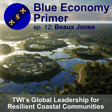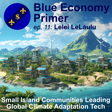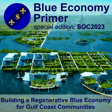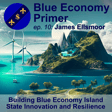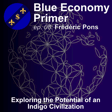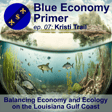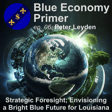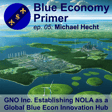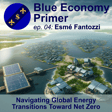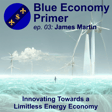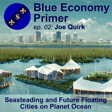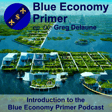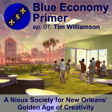
#09 - Maritime Urbanism and the Design of Floating Cities
In this episode, we speak with Dutch floating cities civil engineer and ‘maritime urbanism’ expert Rutger de Graaf-van Dinther, a pioneer and global leader of the seasteading community with more than 15 years of international experience in the fields of design, engineering, and policy for climate resilient floating urban development. He explains the origins of his work and lays out Blue 21’s mission to provide maritime urbanism technologies to the hundreds of millions of people who are already impacted by climate change and sea level rise, realizing that these breakthroughs need to happen during this century, while also achieving positive ecological and social impacts. Rutger lays out Blue 21’s multi sector approach to scaling the proven solution sets that will allow humanity to rely on floating cities as safe harbors during coastal storms, while establishing a new regenerative relationship with our ocean environments and providing valuable opportunities in the expanding global blue economy.
Please visit the episode 09 webpage to find additional links, references and background information.
GUEST BIO:
Rutger de Graaf-van Dinther
Co-Founder and Director of Blue 21
Rutger de Graaf-van Dinther is an entrepreneur with more than 15 years experience in climate resilient floating urban development. His mission is to provide floating city technology to hundreds of millions of people who are impacted by climate change and sealevel rise. This needs to happen during this century while achieving positive ecological and social impacts.
With his companies DeltaSync and Blue21, the first stepping stones towards this mission already have been achieved with iconic floating construction projects including the Floating Pavilion Rotterdam and Floating Ecohomes, Harnaschpolder Delft, the Netherlands. More recently, Blue21 was design and technology partner in realizing the Innozowa floating solar project in collaboration with TU Delft. Currently, Blue21 is working on upscaling and mainstreaming floating city technology from 'proof of technology' to 'proof of scale'. This will establish an entirely new field of expertise called 'maritime urbanism' to enable the development of floating neighborhoods and floating cities globally.
Trained as civil engineer with a MSc and PhD (both finished cum laude) of Delft University of Technology, he expanded his knowledge in various additional fields of expertise resulting in peer-reviewed scientific publications in the fields of technology, sustainability and social sciences. Rutger has been a consultant to the Dutch Delta Programme, Topsector Water, City of Rotterdam and international clients from other countries including Japan, China, South-Korea, Singapore, USA and various countries in Europe.
From 2011 to 2021, Rutger was applied research professor of water innovation at the Rotterdam University of Applied Sciences. From 2010 to 2015 he was Editor of the Journal of Water and Climate Change of the International Water Association.
Rutger is (co) author of multiple international books, book chapters, and peer reviewed journal articles. He published together with Henk Ovink, the Special Envoy for Water of the Netherlands, about the "5 Capacities of Climate resilient Urban Areas". This framework was the foundation of the book Climate Resilient Urban Areas, published by Palgrave MacMillan in 2021. International media interviews include the New York Times, Financial Times, BBC World Radio, and Discovery Channel.
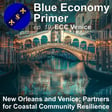
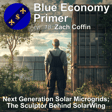
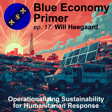

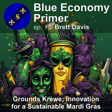
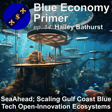
![#13 - Build [Back] Better; Tech Enabled Storm Resilient Coastal Communities image](https://media.zencastr.com/cdn-cgi/image/width=112,quality=85/image-files/63bf157c8c660743f14be65a/98cfe1b8-9955-4de4-b5df-a451e510bb82.jpg)
